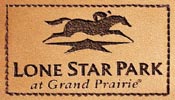|

|
 |
Kentucky Governor Amends Ban on Texas
Horses; Ruling Paves Way for Texas Million Hopefuls Kentucky Governor Ernie Fletcher issued an emergency regulation late Thursday, May 27, changing the restrictions on Texas livestock entering Kentucky that were imposed because of a vesicular stomatitis (VS), which was detected in three horses on an isolated ranch in West Texas nearly 500 miles southwest of Lone Star Park. The emergency regulations will allow livestock from most of Texas - including horses from Lone Star Park - to enter Kentucky under certain conditions. Governor Fletcher's emergency regulation amends the 1998 law that resulted in a ban of all livestock coming into Kentucky from states affected by VS. "I have signed an order that minimizes the impact of the ban on the Kentucky livestock industry while maintaining adequate protections for Kentucky animals," Governor Fletcher stated in a press release. The ruling paves the way for Kentucky horsemen to reconsider shipping their horses to Lone Star Park for Monday's sixth annual Lone Star Million. In order to return to Kentucky, horses must have a negative VS test within the 30-day period preceding entry into Kentucky. "This is extremely positive news," said Jeff Greco, Lone Star Park's Vice-President and General Manager. Greco said that officials in Lone Star Park's racing office were "working tirelessly" Thursday evening to communicate the news to Kentucky-based horsemen. "We're hopeful that we might be able to add a runner or two to our
races," Greco said. On Wednesday, Texas Racing Commission veterinarians completed examinations of 1,450 horses stabled at Lone Star Park in Grand Prairie, Texas, and none showed signs of VS. VS can affect horses, cattle, pigs, and occasionally, sheep, goats and deer, causing blisters to form in the animal's mouth or along the hooves. On May 19, the National Veterinary Services Laboratory in Ames, Iowa, confirmed that three horses on a ranch in a remote and sparsely populated area near Balmorhea, Texas, had clinical signs of VS. Promptly, all livestock on the affected ranch - located approximately 480 miles southwest of Lone Star Park near the New Mexico border - will remain quarantined for several weeks, until they no longer pose a health threat to other livestock. Since the three horses were found to have clinical signs of VS, no other livestock in the area, including six additional horses and eight head of cattle on the affected ranch, have been diagnosed with the viral disease. Greco said that Lone Star Park will continue to monitor the situation closely and all horses that enter the stable area will be examined by Texas licensed veterinarians to eradicate concerns about VS. |
| Back to News |
BENEVOLENCE | BENEFITS | GROOM ELITE | PERSONNEL | LINKS | CONTACT US
